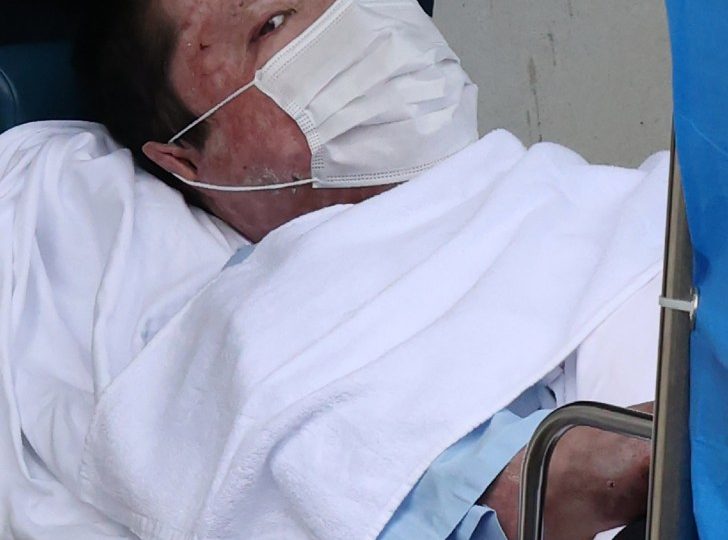A MAN responsible for burning 36 people alive after starting a blaze that ripped through an anime studio in Japan has been sentenced to death.
Shinji Aoba, 45, stormed into the building in Kyoto in July, 2019 screaming “drop dead” before setting it alight in one of the deadliest crimes in Japan’s recent history.
EPABlistered Shinji Aoba is seen after the arson attack that killed 36 and left him in hospital for 10 months[/caption]
EPAThe horror attack was one of the deadliest crimes Japan has seen in recent decades and devastated the anime community[/caption]
The blaze tore through the beloved studio killing dozens of young artists
Aoba had pleaded guilty last year to starting the blaze at Kyoto Animation No. 1 studio that killed dozens of mostly young artists and shocked the anime industry and its fans across the world.
On the morning of July, 18, 2019, survivors described how Aoba broke into the building, spread gasoline around the ground floor, lit it and shouted “drop dead”.
During the blaze, a number of victims were found on a spiral stairwell leading to the roof, suggesting they were overcome as they desperately tried to escape.
“There was a person who jumped from the second floor… but we couldn’t rush to help because the fire was so strong,” one woman told local media at the time.
More than half of the studio’s 70-strong workforce was killed in the attack and 30 others were injured.
“The act of pouring an enormous amount of gasoline and setting it ablaze is extremely likely to be fatal, and immolating people is truly cruel and inhumane,” Chief Judge Keisuke Masuda ruled today.
The victims “were engulfed in fire and smoke in the blink of an eye… They died an anguishing death as the studio instantly turned into a hell,” he added.
Judge Masuda sentenced Aoba to what critics call a painful death by long-drop hanging after finding him guilty of murder, attempted murder and arson.
Aoba’s lawyers had attempted to seek a lighter sentence on the grounds of “mental incompetence”, however judges ruled that the arsonist knew what he was doing.
Prosecutors had longed demanded the death penalty for Aoba and said his crime was motivated by a desire for revenge.
Aoba believed that the studio – known by its fans as KyoAni – stole his ideas, prosecutors said, a claim the company has denied.
“The delusion that KyoAni Studio had plagiarised his work influenced his motivation,” prosecutors told the court.
But they added that such “delusions” did not cloud his ability to carry out the attack with full understanding of his actions.
During his guilty plea in September, 2023, Aoba had admitted he did not think so many people would be killed.
“I felt I had no other option but to do what I did,” he said at the time. “I feel tremendously sorry and the feeling includes a sense of guilt.”
Aoba, who was arrested near the scene, suffered burns to over 90 per cent of his body and only regained consciousness weeks after the fire.
He was only able to be arrested after 10 months in hospital during which he underwent 12 operations.
Japan is one of the few developed countries where capital punishment still exists.
There is overwhelming public support for the practice – a 2019 government survey found that 80 per cent of Japanese people saw the death penalty as “unavoidable” and only nine per cent voted to abolish it.
At the end of 2023, 107 people were on death row.
Hanging has been Japan’s sole execution method for around a century-and-a-half.
However, it has been heavily criticised for the “cruel” and “secretive” ways it is carried out.
Critics argue that Japan leaves death row inmates on tenterhooks in solitary confinement for years before they are given little or no warning at all and executed.
In the past, families have only been notified about the execution after it has taken place.
No executions were carried out in Japan in 2023 but there was one in 2022 and three in 2021.
Convicts In Japan are led to the gallows blindfolded, with their feet bound and hands cuffed.
A trapdoor opens below them when several prison officers each press a button simultaneously in an adjacent room. None is told which button triggers the deadly mechanism.
Many have argued that long-drop hanging is prone to botched executions and makes for a long, agonising death.
Aoba was sentenced to death today in a courtroom packed with family members of the victims. One person was heard crying and covering their eyes as the judge spoke.
Dozens of KyoAni fans braved snow to stand outside the courthouse, with one of them Renji Kiriyama, 27, recalling hearing about the fire on his car radio.
“With all the news reports about this case, I hope this will expose more people to KyoAni. If this spreads the name of KyoAni and brings its works to more people and more people know its name, I would be happy.”
“I hope the verdict would ease the burden and anguish of the families even a little,” said Kentaro Hatanaka, another fan.
“I hope KyoAni will again bring to the world kinds of animations that are filled with life as they did before this happened,” he added.
Founded in 1981 by a husband and wife, KyoAni is a beloved institution for anime fans, responsible for popular TV series including “The Melancholy of Haruhi Suzumiya” and “K-ON!”
After the attack, there was shock and grief in Japan and worldwide, with Apple CEO Tim Cook among those tweeting his support and a crowdfunding campaign raising £1.8million to help the firm.
Hideaki Hatta, company president, welcomed the verdict today but said that the “thought of all our employees who perished… just breaks my heart”.
AFPJudge Keisuke Masuda (pictured top centre) handed down the death sentence today[/caption]
The judge ruled that Aoba was not suffering a ‘mental disorder’ and had acted in full capacityGetty
AFPInside an execution room at Tokyo’s detention house[/caption]
EPAPeople line up under snowfall for hearing tickets before the verdict in the Kyoto animation arson and murder case[/caption]
AFPA protest denouncing the death penalty in front of the Justice Ministry in Tokyo in 2014[/caption]
Leave a comment








